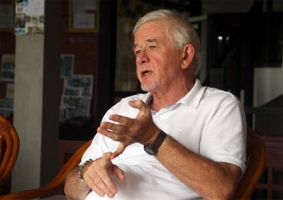
Manus Campbell talks about the horrors of war (Photo: VnExpress)
Manus Campbell could hardly imagine finding himself so comfortable in Vietnam, where he and other American soldiers experienced the grief and traumas of war.
Campbell became a combatant in the Vietnam War in 1967 at the age of 19. Between June 1967 and July 1968, he took part in battles in Quang Tri, Dong Ha and Con Tien. He witnessed many villages of innocent people, including children, ravaged by bombs dropped by his countrymen.
Now he regularly sits in a café along the Hoai River in the ancient town of Hoi An, where he receives Vietnamese, Japanese and Korean friends, to tell war stories.
He recently spent two hours talking to a VnExpress reporter about his feelings for the country he once invaded, and in which he now resides.
“I was very nervous the first time I came back to Vietnam after the war.
“I wondered how the Vietnamese people would treat me, but they in fact welcomed me.
“They did not get angry or hate me.”
In 2000, Campbell visited a pagoda in Hue. He found nuns opening a school for disabled and orphaned children. He decided to provide financial help to the school.
He sent money to the school and received photos of the children sent by the nuns every month.
In 2009, he established the nongovernmental organization Helping Invisible Victims of War (HIVOW).
Three years later, during a one-month trip to Hue, he decided to spend the whole year there. He spent his days working in a school for needy children, visiting and providing financial assistance to another pagoda where disabled children were being cared for.
He also has also donated funds to ethnic minority groups in Hue and Quang Tri.
Campbell said he met an 80-year-old woman who had fought in the war with her husband and that the woman invited him into her home.
“When I was about to leave her house, the woman told her sons and daughters that ‘this American guy is here to help disabled children, so we will treat him like a family member.’
“Her children then built a house next to hers for me to rent, while the woman called me ‘son,’” Campbell said emotionally.
Campbell also dined with four Vietnamese veterans, one of whom told him they were able share a table thanks to the Vietnamese cultural trait which teaches people not to hold grudges or indulge in hatred.
As a member of the organization Veterans for Peace, HIVOW funds a trip for American veterans who were affected by Agent Orange each year, helps raising funds for a RENEW (Restoring the Environment and Neutralizing the Effects of the War) project in Quang Tri that gives cows to farmer families there.
Early this year, Campbell moved to Hoi An to continue his charity work.
“I am trying to send a message about the terror of war; that [in war] no one actually wins.
“Everyone, including innocent people living in the war-affected areas, the families of Vietnamese and American veterans, suffers from pain.”
He said many American veterans resorted to alcohol and drugs, while others committed suicide, because they could no longer bear that pain.
“They do not want to remember how angry and saddened they became upon realizing the American government had lied about the war.”
He said he can only heal his pain by retelling the stories or by crying.
“When will you come back to the US?” the reporter asked him.
“I am home already,” he replied without hesitation.
Campbell said he felt like he was going home every time his plane touches ground at the Da Nang airport.
“I will only return to the States to visit my relatives.”
Thanh Nien News






